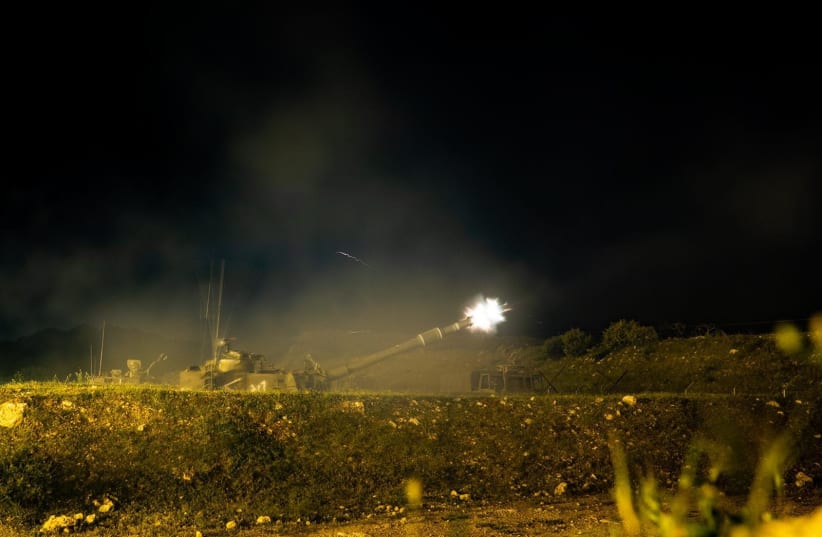The IDF fired dozens of artillery shells toward sites in southern Lebanon after a rocket was fired into northern Israel near the town of Shlomi.
The retaliatory fire targeted the launch area as well as an unspecified “infrastructure target,” the IDF Spokesperson’s Unit said.
IDF Spokesperson Brig.-Gen Ran Kohav wrote on Twitter that the retaliatory strikes were made “in order to make it clear to those on the other side that we do not intend to accept any violation of Israeli sovereignty. We have a variety of tools in order to respond, and there is no intention to allow for such fire to continue. We are not going to get used to even a single rocket; we will continue to respond as necessary.”
Kohav added that there is no change in the alert level along the northern border and that Remembrance Day and Independence Day will pass quietly.
“It is our job to protect the State of Israel and we will continue to do so,” he said.
The rocket fired from southern Lebanon on Sunday night fell in an open area near Kibbutz Matzuva. Large explosions were heard across the northern border but no rocket siren was sounded and the Iron Dome was not used to intercept the projectile.
The Lebanese Al-Akhbar newspaper reported that the rocket was fired from between al-Ma’aliyah and Qlaileh in southern Lebanon, south of Tyre. On Monday morning, the Lebanese Army found two 122mm. Grad rockets on a launcher near Qlaileh. The rockets were disabled by specialized units.
The United Nations Interim Force in Lebanon (UNIFIL) said the head of Mission and Force Command Maj.-Gen. Aroldo Lázaro was in “immediate” contact with both sides and urged restraint.
“Nonetheless, the Israel Defense Forces fired back several dozen shells into Lebanon,” UNIFIL said in a statement later in the day, adding, “Maj.-Gen. Lázaro called on all parties to avoid further escalation, expressing his concerns about the disproportionate response.”
UNIFIL said that after the Israeli shelling, the Interim Force opened an investigation into the rocket fire.
While no one has taken responsibility for the rocket fire, it is believed to have been by Palestinian operatives who belong to Hamas in southern Lebanon.
Hamas has been active in Lebanon for decades and its military activity in the country is carried out under the assistance, initiation and supervision of the Palestine branch of the Iranian Revolutionary Guard Corps’ Quds Force.
Kochav told KAN Reshet Bet radio on Monday morning that the IDF believes the rocket fired by Palestinian factions “is connected to the Ramadan period and the events at the Temple Mount.”
According to Army Radio, the defense establishment is considering the possibility that Hamas ordered the rocket fire following the closure of the Erez crossing between Gaza and Israel.
IDF Chief of Staff Lt.-Gen. Aviv Kohavi held a situational assessment with senior defense officials on Monday morning.
Defense Minister Benny Gantz said the Lebanese government is responsible for all that happens on its territory and warned against additional rocket fire.
“Tonight we saw rocket fire from Lebanon, and the State of Israel demands that the Lebanese government take responsibility. If terror and violence continues, we know how to use the necessary force against the right targets.”
The rocket fire from Lebanon comes after several rockets were fired last week from the Gaza Strip toward southern Israel amid tensions at al-Aqsa Mosque and the Temple Mount.
Last year, rockets were fired from Lebanon during Operation Guardian of the Walls in May, then again in July and again in August.
After the rocket fire in July, Prime Minister Naftali Bennett stated that Israel would not tolerate rocket fire from Lebanon.
“I say this sharply and clearly: We will not allow harm to Israel’s sovereignty and security,” he said. “Whoever tries to harm us will pay a painful price.”
Kohavi said at the time that “we will respond in an overt or covert way, or both together, to all violations of our sovereignty from Lebanon – whoever it is.”
The IDF believes that Palestinian operatives also fired the rockets in May, July and August of last year.
After the IDF’s response to the rocket fire in August that targeted the launch site with some 100 artillery shells and an airstrike targeting a road used by the terrorists, Hezbollah fired nearly 20 rockets toward open territory in northern Israel.
Also on Tuesday, Israel’s Ambassador to the UN Gilad Erdan called on the Security Council to do more to prevent Hezbollah’s military buildup in southern Lebanon, near Israel’s northern border.
“Hezbollah knows that it cannot defeat Israel on the battlefield so it builds up its arsenal of rockets and precision-guided missiles for the sole purpose of attacking Israel’s home front: civilians and critical infrastructure,” Erdan told the UNSC at it’s monthly meeting in New York on the Israeli-Palestinian conflict.
“While the villages of southern Lebanon have become terror bases and every tenth home has become a Hezbollah arms depot, it is only a matter of time now before this critical strategic threat to Israel, second only to a nuclear Iran, will force Israel’s hand. Israel will have to defend its citizens,” Erdan said.
“If action is not taken today – not tomorrow, today – the next conflict with Hezbollah will come at a very heavy cost. The price of today’s neglect will be tomorrow’s destruction,” Erdan warned.
United Nations Special Coordinator for the Middle East Peace Process Tor Wennesland said he was concerned by the rocket that was fired at Israel from Lebanon early on Monday as he urged “restraint on all sides.”
UNIFIL “continues to engage with the Lebanese Armed Forces to increase its counter rocket launching operations to prevent further such incidents and contribute to stability along the Blue Line,” Wennesland said.
